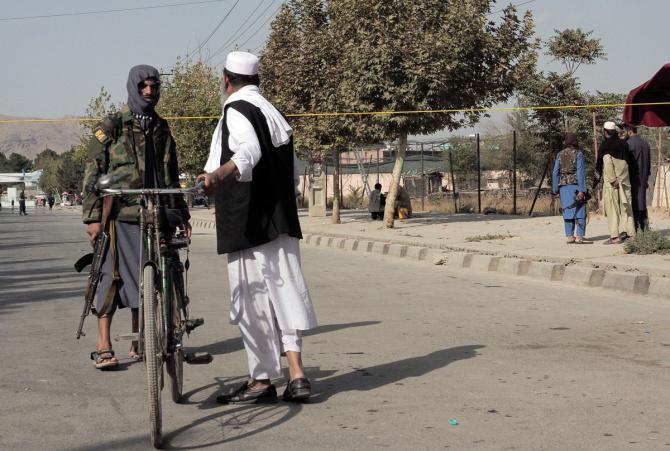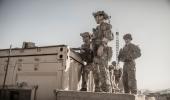Pakistan would want to take full advantage of the situation to direct Taliban trained terrorists into the Kashmir Valley, alert Lieutenant General Ashok Joshi (retd) and Colonel Anil A Athale (retd).

In the mid 1980s, the US decided to leave no stone unturned, and opted to use all the means at its disposal to oust the Soviets from Afghanistan.
General Zia-ul Haq of Pakistan became more than a willing partner in this enterprise.
If the Islamic Republic of Pakistan could help their good old friends -- and not masters -- to throw out the godless Soviets, Pakistan would benefit here and now, and a meritorious deed would also have been done to take care of the afterlife.
The CIA stepped in with enthusiasm with their technology, expertise and information.
Further, they would participate in training and equipping the would be mujahids.
'Through us, please,' was a request by Zia. Let the CIA train Pakistan army personnel who would learn quickly,and then pass on the skills and equipment to the mujahideen.
How could the CIA ignore such a constructive suggestion? Afghans in large numbers were turned into effective mujahids. Skills with weapons and explosives came naturally to them.
Pakistan was happy because it could select, train, and equip the 'freedom fighters' whom they sent into the Kashmir Valley.
The CIA looked away. There was a little matter of Pakistan developing a nuclear bomb; this time around, the US administration decided to look away.
The mutual support and cooperation between the US and Pakistan peaked, and Pakistajn became a frontline State for which the US could not do enough.
Apart from mujahids, the Pakistan army also decided to train young Pathans who were religious students, or 'talibs' to be soldiers and terrorists.
They soon emerged as full-fledged jihadists. Lieutenant General Hamid Gul of the Pakistan Army, who headed the ISI, was their godfather. He supported them even as he pursued other Islamic agenda.
Everything turned out as planned by Pakistan.
In this atmosphere, after the Soviets had been forced out, Afghanistan attracted committed jihadists from Islamic countries, stretching from Egypt to Saudi Arabia.
Most of them wanted to establish the rule of 'sharia' law worldwide. Violence was their selected means, and terrorism was their doctrine.
They looked up to Pakistan for sustenance, guidance, and inspiration.
It is obvious that the CIA or other Western intelligence agencies did not take them seriously at the time.
It was in this atmosphere that al-Qaeda thrived in southern Afghanistan, and led and directed the terrorists who struck the US World Trade Center and the Pentagon on September 11, 2001.
The US took more than 3,000 casualties. It was at that stage that the US declared war on terror.
Pakistan was tersely told by then Us deputy secretary of state Richard Armitage that either it was with the US, or against it.
There was no room to maneuver. The US had become suspicious of Pakistan.
Therefore, General Pervez Musharraf did a U-turn on a dime, and 'joined' the US in its war on terror, or said so, anyway.
Very skillfully, before the US carpet bombing started, Pakistan airlifted its personnel out of Afghanistan to Pakistan.
This was permitted because the US had to use the land route in Pakistan from the port city of Karachi to the Pak-Afghan border to transport tanks and other heavy equipment.
Eventually, the US inducted close to 98,000 troops into Afghanistan. Other NATO nations also contributed troops, basically as an indication of solidarity.
These best equipped and motivated troops did their best, but they too could not establish the rule of law in Afghanistan.
Insurgency on a massive scale continued. The US took more than 2,000 casualties, the last of them as recently as August 26, 2021.
During all this time, Pakistan expertise in double dealing came in handy.
Pakistan helped the US to capture some terrorists who were involved in 9/11. This well calculated move helped Pakistan to re-established its credentials with the US.
Pakistan's entire attitude and effort can best be represented by its success in hiding and protecting Osama bin Laden until Operation Geronimo in May 2011.
An elected and representative government in Afghanistan just does not meet the Pakistan requirement.
Pakistan looks upon Afghanistan as its backyard which it can enter any time its wants.
Rather than a friendly Afghanistan, Pakistan would preferably have a compliant client State.
This alone can explain how Pakistan expects Afghanistan to yield 'strategic depth' to it in the event of war with India.
A representative government in Afghanistan is more likely to promote and protect its own interests rather than those of Pakistan's.
The Taliban was created to subserve Pakistan vision and interests even as it spread Islamist terrorism.
Pakistan has largely achieved in Afghanistan what it has wanted to -- that is Islamisation.

NATO forces struggled for nearly 20 years in Afghanistan without achieving their purpose. The casualties they had taken seemed to have been in vain.
Fundamentalism persisted. This was a strange situation: Even as the US formally backed the government in Afghanistan, it was negotiating with the Taliban at Doha.
An agreement between the Taliban and the US was signed on February 20. It was obvious that NATO forces, including US contingents, had lost their will to fight.
Dealing with and compromising with evil, no matter how advantageous it may seem at the time, ultimately proves counter-productive.
British Prime Minister Neville Chamberlain negotiated with Nazi Germany, and it proved disadvantageous not only to England but also to Europe.
The ground conditions in Afghanistan in August 2021 do not seem to be any different than they were twenty years ago.
The basic purpose for which the US stepped in remains unfulfilled. The US has abandoned the mission it had taken up entirely on its own.
This abandonment may well be looked upon by the Afghan associates of the US -- institutions, and individuals both -- as a betrayal. The tender mercies of the Taliban are likely to visit them.
It was the US that had persuaded its NATO allies to participate in the annihilation of Islamists who cannot look beyond their interpretation of Islam and practice terrorism with religious zeal.
Now everything has crumbled and Afghanistan is on its way to anarchy; even worse, it is in the hands of morbid fanatics.
Many may recall that the US had similarly decided to pull out of Vietnam, or Iraq for that matter, without accomplishing its mission.
What is inexplicable in the American withdrawal is the unpardonable blunder of letting a huge arsenal fall into the hands of the Taliban/Pakistan alliance.
'Spiking of the guns' before withdrawing is an age-old military practice.
By failing to conform to it, the US armed forces have not only brought infamy upon themselves, but may well be creating a 'Syria' in the subcontinent.
This has definitely created a threat to India on the western border just when the US expects India to join the Quad in an effort to contain China!
Or is it the resumption of the 'love fest' with Pakistan, with the UK looking lovingly at its 1947 progeny?
Or is the CIA harbouring an illusion that the Taliban can be turned against China to help Xinjiang Muslims?
Do the Americans also wish to use the Taliban to overwhelm the Central Asian republics currently under Russian influence?

Whatever is the wishful thinking of the Americans, in a strategic sense it marks a return to the 1990s as far as India is concerned.
At that time the US, China and Pakistan had ganged up against us while our erstwhile friend Russia was in turmoil.
We may well have no choice except to grit our teeth, and plough a lonely furrow.
Let us be prepared for a wave of terror worse than in the 1990s, as thanks to the American armed forces, the terrorists would now be better armed than even the best that India would be able to muster.
It is instructive to note that all the media noise about 'good behavior' by the Taliban is presently confined to their treatment of women.
The Americans have obviously cut a deal so that no terrorists targeting the US are sheltered in Afghanistan.
The Taliban may have been, at best evasive, when it comes to sheltering terrorists who target India.
We ought not to forget the IC-814 hijack of December 1999 and freeing of Jaish e Mohammad head Masood Azhar.
Like we have implemented a policy of active retaliation against Pakistan (the surgical strikes and the Balakot airstrike) it is time we warn Afghanistan also about retaliatory missile strikes by us.
All available means, not excluding ship-launched missiles, might well be employed to strike targets in Afghanistan, if need arises.
This would be the best insurance against the Taliban reverting to bad old days of the 1990s.
Very soon, under the tutelage and support of the Taliban, all Islamic terrorists will be attracted to Afghanistan.
It appears as if the world is back where it was 20 years ago.
All the sacrifices of all the nations who tried to establish the rule of law and a representative government in Afghanistan may well prove to have been in vain.
Pakistan would want to take full advantage of the situation to direct Taliban trained terrorists into the Kashmir Valley.
Some thoughtful Pakistanis are apprehensive that the disease of fundamentalism may well spread to Pakistan.
In some ways the gulf between the ruling elites and the lower social strata of Pakistan (from where the bulk of soldiers come) is quite similar to Afghanistan.
The spread of a Taliban-like contagion to nuclear armed Pakistan is a real danger to world peace.
There is no easy solution to the problem in sight.
A beginning can be made by imposing severe economic sanctions on Afghanistan, and also on Pakistan, if it supports Islamic terrorism in the Af-Pak region or anywhere in South Asia.
Lieutenant General Ashok Joshi (retd) served in the Indian Army for three decades. He was the Chhatrapati Shivaji Fellow at Pune University and author of Restructuring National Security published by Manas Publications in 2000.
Military historian Colonel Anil A Athale (retd) is a former Chhatrapati Shivaji Chair Fellow at the United Services Institute of India.
Feature Presentation: Aslam Hunani/Rediff.com










